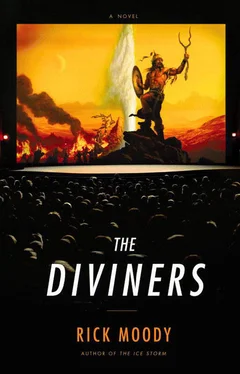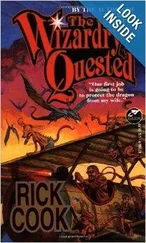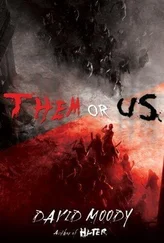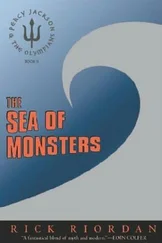Felicia has forbidden her strong-headed son Bennett Adams from going to the party at the Burns residence. Because of the trouble with Edwin. But that’s not the kind of forbidding that’s going to keep any teenager from doing exactly what he means to do. Felicia has to go out “to work,” or that’s what she tells Edwin and the kids, and there’s a van waiting at the curb, driven by Rose Liggett, also a werewolf, and it takes Felicia into the woods, where she will meet the thirty-five other members of the pack. The boys are left behind to finish the washing up, and Edwin is slumbering in Felicia’s bed, moaning in pain. Vern, who might have a little touch of obsessive-compulsive disorder, is lining up the flatware on the countertop in the kitchen, the knives with the knives, the spoons with the spoons. He doesn’t even see when his brother goes right out the front door.
Bennett telephones for a cab on the corner, and he gets in the taxi, spending money from his part-time job at the sporting-goods store at the mall in New Rochelle. He ditches the taxi on the road a block over from the Burnses’ house. He’s going to walk in the front door as if he’s come from the wilderness or as if he’s the hero from a Maupassant story, which he sort of is. He comes from New York, not from Connecticut, he comes from the disadvantaged part of Westchester County, but he can put on a good masquerade, and he’s putting one on now, having dressed up in the wardrobe of the kids of Fairfield Academy, featuring the threads of J. Crew and Banana Republic. He passes between the antebellum columns of the Burns residence, and then he crosses the imperial threshold. Inside, the kids are hanging off of every piece of furniture, and the music is blasting, the kind of music that occurs only at the parties of television shows.
Meanwhile, back among the audience, in the Park Avenue apartment of Madison McDowell’s parents, who, like the Burnses, are away for the night, Madison tells Zimri Enderby that she doesn’t know why they can get so much right on television, things that the movies can never get right anymore, like discomfort and awkwardness between people, and the long, slow development of characters, the ups and downs of long-term relationships, but they can never get the music right. Zimri doesn’t know much about it, since he was never allowed to go to parties as a kid, except parties where they served ginger ale and there was bingo and sing-alongs. He doesn’t know what the music should sound like. Zimri is sitting on the floor, so he can get closer to the television, and Madison is touched by the fact that he is on the floor and still wearing his impeccably polished loafers. Her cell phone rings, and she looks at the number, and she realizes that it’s the Vanderbilts calling. They always call during The Werewolves of Fairfield County. The Vanderbilts are just really pissed that this stuff is happening, that there are these shows, you know, that are just, like, really popular, and they have nothing to do with this popularity, mainly because the producer is, like, such a bitch. The Vanderbilts could really give her some phat ideas about guest stars, like models and recording artists who should definitely be on the show, but Madison doesn’t answer the cell phone, she just flings the phone across the room and then she tumbles back into the middle of the story.
Bennett Adams sees Merry Burns coming down the stairs! A blessing is promised in the moment, because Merry sees him, and he sees her, and the contagion of desiring passes back and forth like in a closed-circuit diagram. Everyone sees them seeing each other, and we see them seeing each other. Everybody knows better than to get in the way of that binding of gazes. There’s a hurtling movement to the episode, to the way that two beautiful teenagers draw near to each other. And there’s some witty repartee, as when Bennett says that he’s especially thankful this year that her parents have gone out to some cocktail party, and Merry says she’s thankful that they thoughtlessly “left the liquor cabinet open, wow, how did that happen?” She also tells him that the teacher from school, Ms. Carter, who was supposed to chaperone, called and said that she’d had a medical emergency and wouldn’t be able to fulfill her obligations. When this banter is over, the two of them are dancing to some slow ballad, and their heads are on each other’s shoulders, and it’s adorable, and Madison McDowell and Zimri Enderby, like so many other watchers of the program, are almost convinced that the episode is going to have a happy ending. It’s almost like Bennett Adams is not going to have to agonize for the rest of this ominous school holiday. Maybe he can forget about the drug cartel that left Edwin for dead on a street corner, and the legacy of his own absent father, and the money problems faced by his mother, and other forces too dark for him to understand yet. Merry Burns takes him by the hand, and they head up the stairs.
Madison slides down onto the floor, in her silk pants, and she rows herself across the floor to where Zimri sits, and she tells him that he’s sexy for a guy from Utah, and then they fall into their own forbidden embraces, during another commercial break. Before the break is over, he has lifted her up off the floor, so that she won’t get her pants any dustier, to carry her down the hall to the bedroom.
If Annabel’s mother, the psychologist, has a view on sexuality as depicted on television, it’s that the excessive saccharine of this sexuality is bound to create expectations, and not just among young people, who are almost honor bound to expect that when they finally get naked with their friends the earth will tremble or there will be the sounds of rockets going off in their ears or they will feel an overwhelming and intoxicating love, more addictive than heroin, and this love feeling, called forth by the commingling of bodily fluids, will never take leave of them, until death comes for them. The male characters on television, of course, are noteworthy for abandoning the girl characters. This is one of the guarantees on television these days. The male is often a cad. Whereas no feminine protagonist can possibly be wanton, nor can any girl toy with the male affections, according to the psychologist, and that’s according to some sort of misguided affirmative action, and perhaps it’s not the worst thing. Even the adults, according to the psychologist, are at risk in viewing these sexual encounters. It’s possible that they may feel a faint trace of jealousy about the long decades of adult sexuality, which are generally of muted and gentler tones. What television needs, according to Deborah the psychologist, is more sex, not less. Lots and lots and lots of sex, but sexuality that is resplendent in its many hues, not just this young man chasing the young woman up the stairs, and then getting into bed and pulling the covers up, and then banging away in missionary position. What television needs is bad sex, it needs premature ejaculations, and women forgiving men for premature ejaculations, and it needs impotence, lots and lots of impotence, it needs dry vaginas, it needs lubricants, it needs Viagra, it needs pornography as a marital aid, and it needs other performance enhancers, vibrators, perhaps dildos. Entire episodes devoted to these things. How often does a dildo get mentioned on television? Surely the Southern Baptist Leadership Conference wouldn’t begrudge the FCC a dildo or two? Nobody is hurt by a dildo, unless it’s boys using them on themselves without adequate preparation, or groups of girls using those two-headed jobs without knowing how.
“Shut up, Mom,” Maximillian says to his mother.
The camera picks up a pair of house cats in the Burns household. The cats just happen to be in the room with the two young lovers, and the cats are fighting, as house cats will do, one batting the other around the head. The cats freeze, dash just out of the shot and then back into it. We hear the breathy importunities of Merry Burns on the bed, and then we hear something else. We hear something very different; we hear something almost animal. .
Читать дальше












